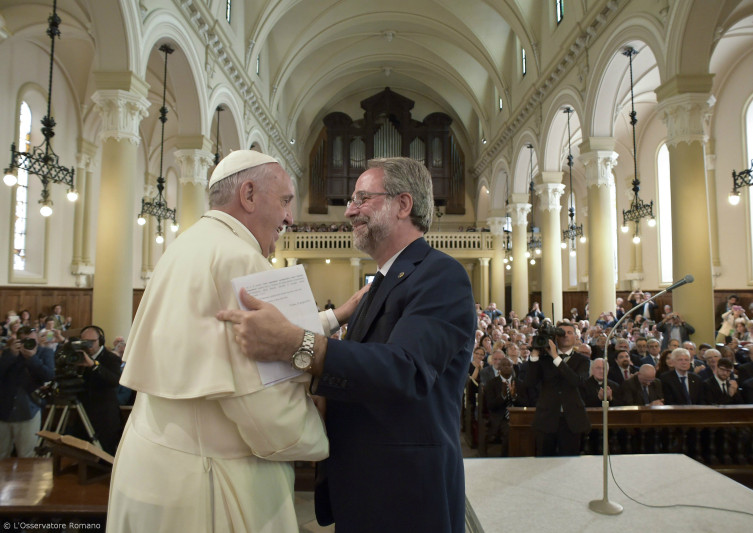With all due respect, that is a plainly
ignorant statement. All Christians outside the Roman Catholic Church hold the Waldensians in high regard.
Read this book.
https://www.amazon.com/History-Waldenses-J-Wylie/dp/1519095171
And this article.
A History of the Waldensians - Musée protestant
I actually disagree with the above article which claims the Waldensian movement began with Peter Waldo in the 12th century.
The Vaudois (Waldenses) are in fact descended from those refugees from Italy, who, after St.
Paul had there preached the gospel, abandoned their beautiful country and fled like the woman
mentioned in the Apocalypse, to these wild mountains, where they have to this day handed
down the gospel from father to son in the same purity and simplicity as it was preached by St.
Paul. (Arnaud, The Glorious Recovery by the Vaudois).
While the papacy was bringing much of Europe under her control, the two dioceses of Milan and
Turin continued independent. It was unbearable to the papacy that, in the very land in which was
her throne, there should be a Mordecai in the gate. Two powerful forces nullified all her efforts to
annex the Milan territory. First, the presence of the Lombard kings, unconquered until about A.D.
800, assured religious tolerance there. Moreover, the Lombards, like the Goths before them,
rejected so many innovations brought in by Rome that they never admitted the papal bishops of
Italy to a seat in their legislative councils. Therefore, they were promptly called Arians, the name
given by Rome to her opponents.
Because of the desperate attempt of papal writers to date the rise of the Waldenses from Peter
Waldo, all Waldensian heroes before the time of the crusades which largely destroyed the
Albigenses, will be called “early.” This term refers to those evangelical leaders that kept continental
Europe true to primitive Christianity between the days of the apostles and the Albigensian crusades.
Such believers did not separate from the papacy, for they had never belonged to it. In fact, many
times they called the Roman Catholic Church “the newcomer.”
To relate the godly exploits of early Alpine heroes from the days of Vigilantius to Waldo is to
answer the thesis of the papists that the Waldenses did not begin until about A.D. 1160. The most
noted papal antagonist of the Waldenses who has endeavored to brand them as originating at that
date is Bishop Jacques Bénigne Bossuet. Bossuet, the brilliant French papist, is reckoned by some
to be one of the seven greatest orators of history. With almost undetectable shrewdness he analyzed
every item of history which he thought might give the Waldenses an early origin, and then drew his
false conclusions. Of him Mosheim says: “This writer certainly did not go to the sources, and being
influenced by party zeal, he was willing to make mistakes.”18 A casual reader, or one partially
informed, could easily be misled by Bossuet. Full acquaintance with the records, however, exposes
this bishop to the charge of a scandalous misuse of information.
To those who lay too much stress upon Peter Waldo as being the founder of the Waldenses, it can
be said that there were many by the name of Waldo. Particular attention has been called by a papal
author to a Peter Waldo, an opponent of the papacy, who arose in the seventh century.19
Certain papal writers have grouped all religious bodies in Europe hostile to Rome since the year
1000 or earlier, under the title of Waldenses.20 Their reason for doing this can be seen when one
contemplates the record of the growth of the churches refusing to go along with Rome’s
innovations. Consider to what extent the Waldenses were leaders in this policy. The teachings and
organizing ability of Vigilantius gave leadership to the evangelical descendants of the apostles in
northern Italy, southern France, and northern Spain. In those days evangelical churches were
unable to effect visible unity in these sections of Europe. As those who preserved primitive
Christianity multiplied on the Continent and as they contacted the Celts of the British Isles and the
Church of the East, they discovered that they were one in their essential beliefs. Then they realized
more fully the fulfillment of our Saviour’s prediction that His church would be of all nations.
Though great efforts were made to fix various names on these different evangelical groups, even
their enemies, at times, were obliged to recognize that they were “men of the valleys,” or
Waldenses.
The masses of the heathen naturally became a mission field for the efforts of the two rival
communions — Rome and the Church in the Wilderness. Outwardly, the papacy seemed dominant
because of her apparent victories by law, by the sword, and by political alliances. The evangelical
churches, however, increased in power.
The eighth century opens with strong leadership appearing in both of these communions. The
successors of Columbanus, as well as the powerful evangelists of northern Italy and of the Celts,
were making irresistible appeals to the masses. The Council of Frankfort (A.D. 794) attended by
bishops from France, Germany, and Lombardy attests the independence shown by national clergy to
the will of Rome. In the presence of papal legates they rejected the second Council of Nicaea (A.D.
787) which had decreed for the worship of images.22 In the Orient, in this same century, the
independent Church of the East had just erected in the capital of China that famous monument, still
standing, which tells of the wide conquests won by consecrated missionaries in central and farther
Asia.
Wilkinson 'Truth Triumphant'. 

